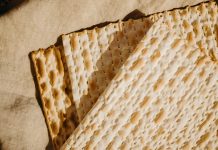I recently reminded myself of a dilemma I have regarding raising my children Jewish. I was standing over the barbeque, smelling the alluring scent of chicken and steak wafting through the air, and wondering why I couldn’t have a bite. After all, I grew up eating plenty of meat, the meat I was cooking was good enough for my wife and kids, and I was plenty hungry. So why not join in the carnivorous feast?
The short answer is that I have decided to become a pescetarian. For those not up on gastronomic lingo, that means that I do not eat poultry or meat but do eat fish. Having given up eating domesticated animals, I couldn’t eat the very meal I was cooking for my family. But if I am willing to eat fish, what’s the hang-up with eating meat? Surely I can’t claim some moral high-ground against the consumption of animal flesh. While cows and sheep might look cuter than fish (have you ever seen a halibut up close? Yuk.), they both constitute living beings whose lives have been taken to satiate my culinary desires. So why won’t I eat the meat I cook for my family? And, conversely, why do I allow my family to eat meat I personally won’t consume?
The answer, surprisingly, is a combination of religious principles and market economics. Having read quite a few Michael Pollen books and other exposés on agribusiness, I am disgusted by factory farming practices. I believe that many features of factory farming—stuffing too many animals into tiny feedlots, feeding animals inappropriate food in order to fatten them up, and causing substantial environmental damage in the process—violate both Jewish law and more general notions of morality. What’s more, many slaughterhouses engage in questionable employment practices, hiring and abusing undocumented immigrants in squalor-like conditions that would make Upton Sinclair blush.
The good news is that there is a burgeoning food movement committed to producing locally-grown, pasture-raised, and drug-free animals. The bad news is that, as a Jew committed to keeping kosher, I can’t partake of this opportunity unless the animals are also slaughtered according to strict ritual-ethical procedures. The rules for keeping kosher pertain both to what type of foods one may eat (no pork or shellfish, for example, and no mixing of dairy and meat products such as a cheeseburger) and to the way animals are killed (only by an expert and pious slaughterer, using a special knife, and slaughtering the animal with a single knife-stroke).
In a major metropolis such as New York or LA, I likely would be able to find pasture-raised, ethically produced kosher animal products. Living in Connecticut, though, I have no such opportunity. So I am left with a dilemma—force my family to live by my personal religious-ethical beliefs and not allow anyone to eat meat or compromise my beliefs. Because one of my children practically lives on a carnivorous diet (he won’t even eat mac and cheese), and because lean meat is often healthier for kids from a dietary standpoint than carbs and starches, I have decided to compromise. I only buy kosher meat and strive to find organic and/or free range options whenever possible. When I can’t, I accept that the meat isn’t ideal but is the best I can do for them for now. And I stare at the grill, salivating.



































I always find Jewish food ‘rules’ (for want of a better word) so interesting… why cant you mix meat and diary? Why cant you eat shellfish.. pork I totally understand (as a muslim myself)
In the UK there are many farms around that sell meat and in some places you can actually ask for it to be killed in the halal way which I think is close to Kosher slaughter (just a few different words; forgive me if Im wrong) I look forward to your answers to my questions 🙂
Hi Amenna. Thanks for your comment. Most Jewish food rules come from the Bible itself. For example, the book of Leviticus specifies numerous categories of animals that were permitted to be eaten, and those which were prohibited (including shellfish, pork, etc.). You might want to check out the anthropologist Mary Douglas’s seminal article, Purity and Danger, which attempts to unlock the meaning behind these prohibitions.
As for not mixing dairy and meat products, the prohibition evolved over time. The Bible says, “don’t cook a baby goat in its mother’s milk.” Through exegesis, early rabbis (approximately 200-400 CE) interpreted that to mean no mixing of dairy and meat, and Judaism has followed that ruling ever since.
You are right that there is a good deal of overlap between Kosher slaughter and halal. Both specify numerous rules for how to kill the animals we eat. Essentially, the rules for Kosher slaughter are slightly more detailed than those of halal, so those who eat halal can eat kosher meat, but those who keep kosher can’t necessarily eat halal.
I hope these answers help you. Please feel free to comment further if you have more questions or insights.
interesting… thanks 🙂